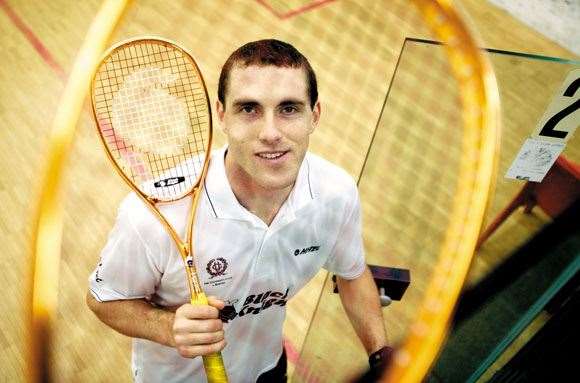Shed your image of squash as the poncy pursuit of private schoolboys.
 David Palmer. Image: Warren Clarke
David Palmer. Image: Warren ClarkeTourney time
“Sometimes our matches go for 40 minutes, sometimes they go for two hours. You get a 90-second break between sets, so it’s not like tennis.
I like tennis and I think tennis players are fit, but I definitely think squash is the harder game. I admire Rafa Nadal for what he did at the Australian Open, but the difference with squash is that during tournaments we don’t have days off between matches, so we play five days in a row, no breaks. Often the key to success is winning your early matches as easily as possible so you have something in the tank for the later matches. If you get sucked into a five-set match on the first day then you’ve got under 24 hours to recover for your next game and you’re struggling.”
Getting Warm
“Because we don’t have days off in between games, preparation is a big thing in squash. Also, with the shorter format of games, you can’t ease your way into a match anymore. You have to be 100 per cent ready on that first point. “My warm-up starts 45 minutes before the match. Depending on the facilities, I’ll try to do at least ten minutes of bike riding or jogging. Then I’ll spend 20 minutes doing some basic stretching – hammies, gluts, quads. Then I’ll get into some more dynamic stuff, ghosting the lunging movements of the game. It’s like a test run – I don’t want to get to the first point of the game, lunge to the front of the court and realise I’m still tight in my hammie. So I ghost my game, play all my shots, and if something is tight then I go back and stretch it. I do this until I’ve found all the little problem areas and sorted them out. Five minutes before the match I’ll do a lot of dynamic movements, getting my body warm. It’s all about quick feet – skipping, plyometric work, jumping. I like to have a really good sweat up by the time I get on the court. But I always make sure, three minutes out, that I sit down and chill-out, think about the mental side of the game, what I’m trying to do with a particular opponent.”
Cooling Off
“Again, with back-to-back matches, recovery is a huge factor. After a match I’ll jump on a bike or jog for 15 minutes. Because of the explosive movements, squash builds up a lot of lactic, so it’s all about flushing that acid out of my muscles. Also, you really need to focus on getting food and drink into yourself 20 minutes after games; I’ve got my sports drinks, my recovery drinks, my bananas.“I don’t normally stretch straight after a match – I like to let my body recover. After getting back to the hotel, maybe an hour or two after the match, that’s when I like to stretch. If I stretch straight after a match, when my muscles are still very fatigued, I’m only doing them more damage.“When I need ice baths, I’ll certainly use them. Not all facilities have them, so I’ve often got my coach buying bags of ice to empty into the bath tub at the hotel. I won’t usually use ice baths after the first rounds of a tournament, but if I’ve had a huge semi-final and I’ve got the final the next day, then I’ll use anything to help me recover – ice baths, massages, getting my Skins on, eating the right food. At 32, I can’t get away with not doing recovery properly.“Then you start again! We might finish a game at ten o’clock at night and then be back on court at three in the afternoon the next day. Typically we like to practise in the morning, back to the hotel for lunch, then back to play in the afternoon. Time goes quick at a tournament.”
– Aaron Scott
Related Articles
.jpeg&h=172&w=306&c=1&s=1)
Langerak to bolster Victory's ALM title bid in January

Socceroo-in-waiting seals Championship deal













